ISLAMABAD: India missed Pakistan’s first official offer of providing consular access to Kulbhushan Jadhav following the verdict by the Hague-based International Court of Justice (ICJ) on July 17.
Pakistan on Friday had offered India to avail a meeting with its national who was in Islamabad’s custody since March 2016 and was currently on death row over charges of terrorism and espionage — an allegation denied by New Delhi.
According to Indian media reports, India, in its reply to Pakistani foreign office, has asked for “unimpeded” consular access to Jhadav, free from “intimidation and reprisal” as Pakistan wants the presence of an official from its side during the meeting.
The spokesperson of Indian high commission in Islamabad told Arab News that “we are in contact with Ministry of Foreign Affairs of Pakistan on this issue, nothing more to add.”
Raveesh Kumar, spokesperson for the Indian Ministry of External Affairs (MEA) had earlier said in New Delhi, “We have received a proposal from Pakistan. We are evaluating the proposal in the light of ICJ judgment. We will maintain communication with Pakistan in this matter through diplomatic channels.”
“We cannot discuss the modalities. We will assess and evaluate the conditions laid down keeping in mind the ICJ ruling and then respond accordingly. Whatever response is to be sent will be given by us timely through diplomatic channels,” Kumar said.
Pakistan’s former High Commissioner to India, Abdu Basit, told Arab News that it’s a high-profile case so “modalities of consular access have to be decided prior to the meeting. It looks difficult that the meeting can take place today [on Friday].”
He said that whenever India granted consular access to any Pakistani prisoner, “Pakistani officer used to meet its nationals in the presence of Indian officials. Pakistan would like to have its official in the meeting but India will ask for private access.”
Talking about the frequency of consular access, he said that “it all depends on where the case is reviewed as the ICJ has left it on the discretion of Pakistani government so it may be multiple times not one time only.”
He also negated the impression that Pakistan rejected all Indian requests of consular access before the ICJ decision. “India had sent seventeen times note verbale for consular access to Jadhav and in January 2017, Pakistan agreed to provide it on the condition of provision of information required about certain individuals revealed by Jadhav in his confessional statement but India refused,” he said.
Ahmer Bilal Soofi, an Islamabad based expert on International law told Arab News, “Pakistan is complying with the judgment of the ICJ as a responsible state by fulfilling the directions of the court which include giving consular access.” On the possible review of the case he added that “the review could be done by the appellant court or the high court in exercise of writ petition or it could also be a special bench.” On Jadhav’s representation in review court he said, “the lawyer should be a Pakistani national because under the Pakistan Bar Council’s rules no foreign lawyer can appear before the Pakistani court.”
Earlier, the ICJ in its July 17 verdict that followed proceedings lasting about two years, asked Pakistan to provide consular access to Jadhav under the Vienna Convention. Although the ICJ had rejected Indian request of acquittal, release and his return.
The UN’s top court did not accept India’s contention that Jadhav was entitled to ‘restitutio in integrum’ (restoration to original position) and turned down its request to annul the decision of a military court. Instead, it ruled that Pakistan, by means of its own choosing, could undergo an effective review and reconsideration of the sentence awarded to Jadhav.
In the following week, Pakistani foreign office had announced by issuing a statement that Pakistan would grant consular access to Jadhav according to the country’s laws, for which the modalities were being worked out.
The statement added that pursuant to the ICJ judgment, Jadhav had been informed of his rights under Article 36, Paragraph 1(b) of the Vienna Convention on Consular Relations.
Jadhav was arrested on March 3, 2016, in a counter-intelligence operation in Balochistan. He was awarded death sentence on April 10, 2017 by a Field General Court Martial in Pakistan. India approached the ICJ in May 2017 against Pakistan for denying consular access to Jadhav.
India demands ‘unimpeded consular access’ for alleged spy in Pakistani custody
India demands ‘unimpeded consular access’ for alleged spy in Pakistani custody

- Pakistan offered consular access upon directions of the ICJ, but with conditions
- Jhadav, arrested by Pakistani authorities in restive Balochistan province, is accused of terrorism and espionage
Pakistan’s army chief meets top UK generals at regional stabilization conference
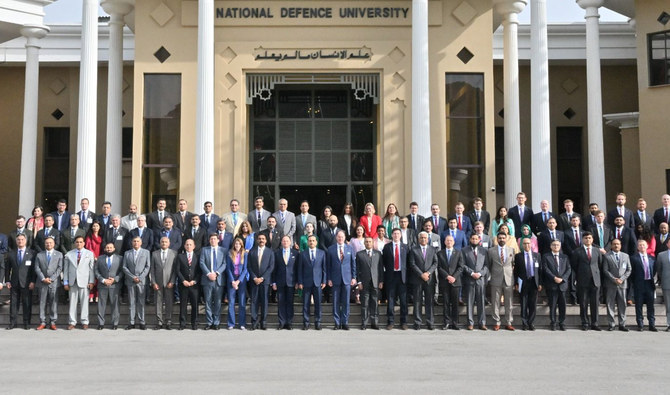
- A 30-member UK delegation is visiting Pakistan until May 3 for the flagship UK-Pakistan security dialogue
- The scope of the discussion this year has been expanded from bilateral to regional issues amid volatility
ISLAMABAD: Pakistan’s army chief General Asim Munir held a meeting with the United Kingdom’s Chief of the General Staff (CGS) General Patrick Sanders on the sidelines of the opening session of the 6th Pakistan-UK Regional Stabilization Conference at the National Defense University on Wednesday.
According to the military’s media wing, ISPR, the conference is a flagship defense and security dialogue alternatively hosted by the two states, bringing together experts from diverse fields including diplomats, defense officials, scholars and civil society representatives.
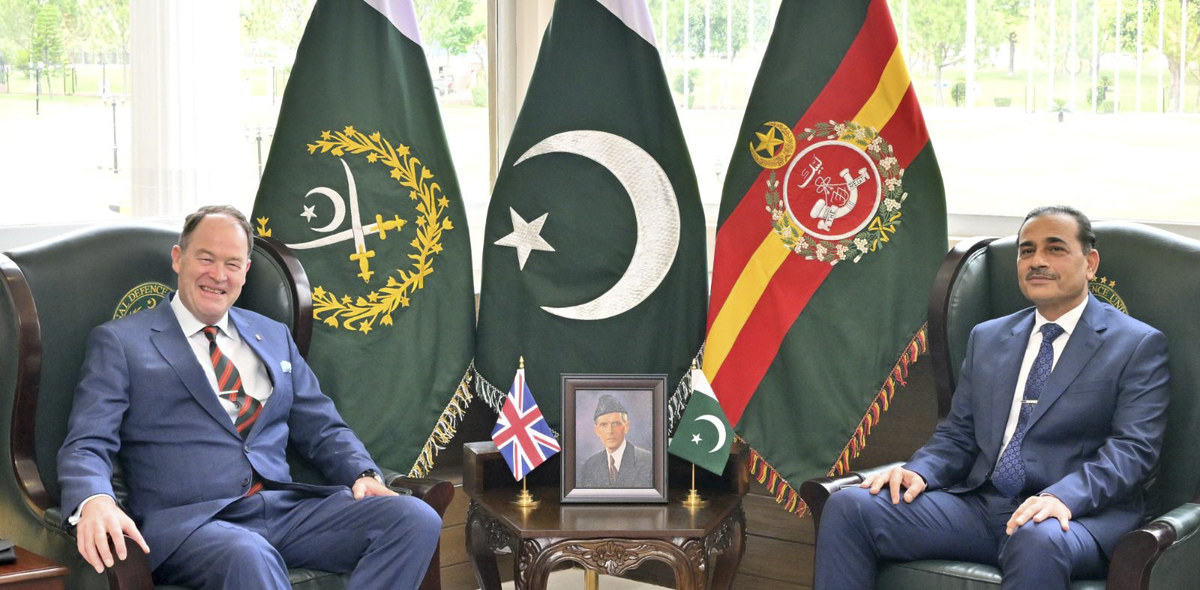
Currently, a 30-member UK delegation is visiting Pakistan in connection with the conference and will stay in the country until May 3.
“This year, the scope of discussion has been expanded from bilateral to regional issues and defense officials of both countries are also participating in the conference,” the ISPR said.
It mentioned the meeting of Pakistan’s chief of army staff (COAS) with General Sanders and the British CGS-designate General Roland Walker in which measures related to further enhancing bilateral defense ties came under discussion.
“The COAS thanked General Patrick Sanders for his services in enhancing bilateral military ties and felicitated General Roland Walker on his nomination as the next CGS of the UK Army,” it added.
Pakistan’s deputy PM arrives in Gambia to discuss Gaza, Kashmir at OIC summit
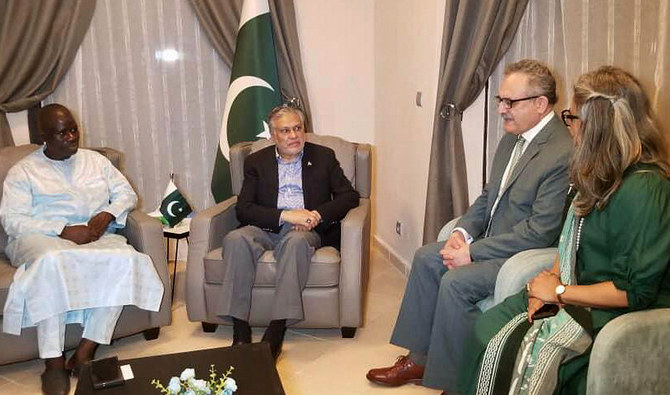
- Ishaq Dar plans to highlight the need to find collective solutions to challenges confronting the Muslim world
- Dar, who also holds external affairs portfolio, will first attend foreign ministers’ meeting before the weekend summit
ISLAMABAD: Pakistan’s newly appointed Deputy Prime Minister Ishaq Dar arrived in Gambia on Wednesday to represent his country at the 15th summit of the Organization of Islamic Cooperation (OIC) where he will discuss the situation in Gaza and present Pakistan’s case on Kashmir.
The OIC summits are convened to discuss and address major issues affecting the Muslim world, ranging from political and economic challenges to social and cultural matters.
These summits aim to promote Muslim solidarity in social and political affairs, coordinate efforts to safeguard the interests and well-being of Muslims and work toward resolving conflicts and issues in the Muslim world.
Dar, who is also holds the portfolio of external affairs, will first participate in the two-day OIC Council of Foreign Ministers’ meeting beginning Thursday before the summit over the weekend.
“At the Summit, the Deputy Prime Minister and Foreign Minister will speak about Pakistan’s perspective on the ongoing genocide in Gaza, the right to self-determination of the people of Jammu & Kashmir, imperatives of solidarity and unity of the Ummah, rising Islamophobia, issues of climate change, terrorism and other contemporary global challenges,” the foreign office said in a statement.
“He will underline the need to find collective solutions to challenges confronting the Muslim Ummah,” it added.
The Pakistani foreign office noted the summit was being convened at a critical time for the Muslim world as the war on the people of Gaza was still continuing.
It described it as an important occasion for the OIC leaders to deliberate upon the dire situation in Gaza and project a strong, collective and unified stance on the Palestinian question.
“On the sidelines, the Deputy Prime Minister and Foreign Minister will hold bilateral meetings with leaders and Foreign Ministers participating in the Summit,” it added.
Innovative ambulance service in Pakistan’s capital offers hope, care for mental health patients

- According to World Health Organization, 24 million people in the country are affected by mental health issues
- Embrace ambulance service has been exclusively focusing on mental health patients since its initiation in 2021
ISLAMABAD: Located just 30 minutes from Islamabad in the picturesque village of Pind Begwal, a unique ambulance center focuses exclusively on mental health patients in and around Pakistan’s federal capital.
The service, named Embrace, was initiated as a pilot project by public health professional Abdullah bin Abbas during the COVID-19 pandemic before it was officially launched last month.
The center addresses Pakistan’s significant mental health challenges, where about 24 million people are affected according to 2023 World Health Organization estimates.
It provides specialized transportation for patients, many of whom display behaviors that are challenging for families to manage, such as isolation or suicidal tendencies.
Operating three ambulances, the service focuses on discreetly moving patients to receive appropriate care, thereby helping to mitigate the stigma associated with mental health issues in the country.
“Since it’s official launch, we have received an amazing response from the public and we have handled 60 to 70 cases just within the past month and this volume is increasing regularly,” Abbas, the center’s chief executive officer, told Arab News on Tuesday.
The concept of mental health ambulances was first tested in Sweden to assist those experiencing psychological distress. This innovative approach allowed for basic help and services to be delivered directly to individuals’ doorsteps, providing timely treatment and transportation to rehabilitation facilities when needed.
Abbas noted that even in major Pakistani cities, the mental health care infrastructure was inadequate. He pointed out this also prompted him to launch the ambulance service after securing initial funding from Columbia University.
“There are a lot of rehab centers and clinics that are being operated in some very unethical environments,” he continued. “So, what we wanted to do was provide a service to the general public which is accessible, affordable and operated in a professional and ethical manner.”
He noted that Embrace had established standards in line with international protocols, under the guidance of an oversight committee that included psychiatrists and psychologists.
He also pointed out that the transport vehicles were designed to be discreet, without any markings to indicate they were serving mental health patients.
“We have a total staff of 15 people that includes both men and women, and they have been extensively trained in psychological first aid, compassionate communication, and how to handle psychiatric patients,” he said, adding that the Embrace staff had interned at various psychiatric clinics and learned how to respond to emergencies.
To make the venture financially viable, the ambulance facility charges for its services based on the patient’s financial condition while keeping it free for deserving patients.
Zainab Nosheen, a first responder nurse at the center, said whenever a call for the ambulance service comes in, the team investigates whether the person needs to be shifted to a health care facility.
“If there is a female patient, then female staff go and help the patient shift to the desired hospital or clinic,” she said, adding the first step was a conversation with the family about the patient’s condition.
“Then, our first attempt is to make the patient agree to go to the doctor with us,” she added. “For that, we have different strategies which vary from patient to patient. At times, our communication takes 30 to 40 minutes to convince the patient to come with us.”
Arshad Mahmood, another first responder, said he had transported 25 patients using the Embrace ambulance service in the last two years, noting that some patients exhibited violent and threatening behavior.
“To deal with such situations, we have also taken self-defense training,” he told Arab News.
“Once we shift the patient into the ambulance, then the attendant decides which hospital to take them to for treatment, and we act accordingly,” he added.
Pakistan to launch ‘historic’ lunar mission aboard China’s Chang’e 6 on May 3
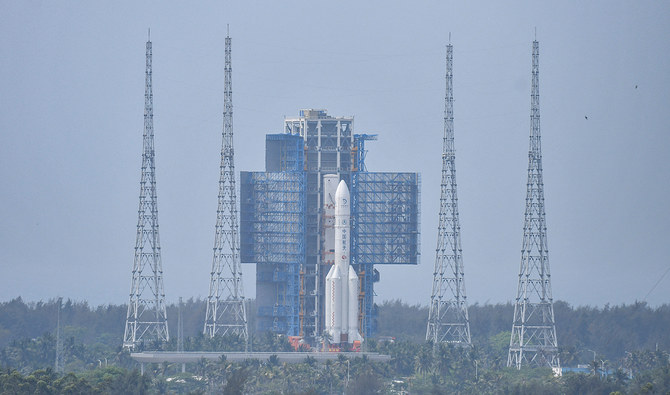
- Pakistan’s Institute of Space Technology has built ICUBE-Q in collaboration with Shanghai University and SUPARCO
- The student-built payload carries two optical cameras to image lunar surface and will be part of China’s mission to the Moon
ISLAMABAD: Pakistan is scheduled to send its “historic” lunar mission (ICUBE-Q) on board China’s Chang’e6 which is scheduled to be launched on May 3, reported the state-owned Associated Press of Pakistan (APP) news agency on Tuesday.
ICUBE-Q has been designed and developed by the Institute of Space Technology in collaboration with China’s Shanghai University and Pakistan’s national space agency SUPARCO.
“ICUBE-Q orbiter carries two optical cameras to image the lunar surface,” the APP reported. “Following successful qualification and testing, ICUBE-Q has now been integrated with the Chang’e 6 mission.”
China is set to launch a first ever attempt to collect samples from the far side of the Moon.
The Chinese mission aims to grab samples containing material ejected from the lunar mantle and thus provide insight into the history of the Moon, Earth and Solar System.
According to the website of the Institute of Space Technology, China’s national space agency allowed Asia Pacific Space Cooperation Organization member states to send student-built payload to the Moon with its mission.
The Pakistani institution built a device that was selected for the purpose after rigorous evaluation.
At least 143 killed in Pakistan’s unusually heavy April rains
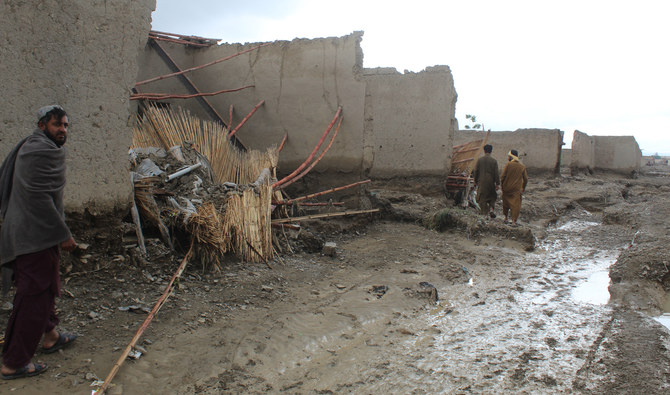
- Pakistan has become vulnerable to unpredictable weather, often-destructive monsoon rains that usually arrive in July
- The largest death toll for April was in Khyber Pakhtunkhwa province, where 83 people died, including 38 children
ISLAMABAD: At least 143 people died in Pakistan from lightning strikes and other storm-related incidents in April, with the country receiving more than twice as much rain as usual for the month, officials said Tuesday.
April brought flash floods, landslides and inclement weather that caused houses to collapse in some areas and destroyed crops in others.
Pakistan saw a rainfall “increase of 164 percent above the normal levels in April, which is very unusual,” said Zaheer Ahmad Babar, spokesperson for the Pakistan Meteorological Department.
“We’ve observed these erratic weather patterns as a direct result of climate change,” he told AFP.
Pakistan is increasingly vulnerable to unpredictable weather, as well as often-destructive monsoon rains that usually arrive in July.
The largest death toll for April was in northwestern Khyber Pakhtunkhwa, where 83 people died, including 38 children, and where more than 3,500 homes have been damaged.
“The fatalities resulted from roof collapse and landslide incidents,” Anwar Shahzad, spokesman for the province’s disaster management authority, told AFP on Tuesday.
In some northern parts of Punjab, the country’s most populous province, harvests of wheat, a staple food, were spoiled by hailstorms.
Environmental expert Maryam Shabbir Abbasi told AFP that overall weather patterns had shifted by “about a month and a half, and we should shift our calendars for the agriculture sector accordingly to avoid damages caused by unprecedented rainfall.”
Officials earlier this month said several people, including farmers harvesting wheat, were killed by lightning in Punjab, and that a total of 21 people were killed in different rain-related incidents.
Another 21 deaths were reported in Balochistan province in April, including seven people who were struck by lightning, with rain disrupting life in some districts and causing school closures.
In parts of Azad Kashmir, 14 people were killed, and at least four were killed in road accidents linked to floods in southern Sindh province.
In the summer of 2022, a third of Pakistan was submerged by unprecedented monsoon rains that displaced millions of people and cost the country $30 billion in damages and economic losses, according to a World Bank estimate.
As several parts of the country were battered by heavy rains this month, Karachi, the largest city, experienced its hottest day of the year on Sunday, with temperatures soaring to 37 degrees Celsius (99 degrees Fahrenheit).










